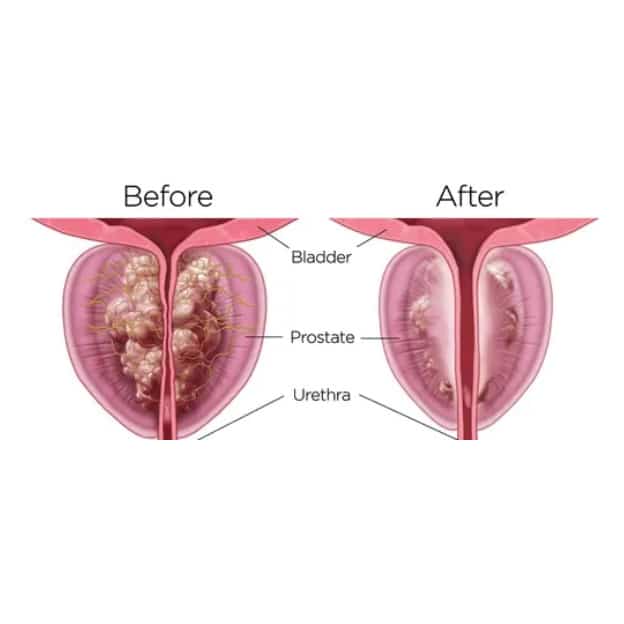Enlarged Prostate (BPH) in Florida
Tackling BPH Head-On
Living with BPH
More than Just a Simple Urge
Every man has his daily routine—his morning coffee, the familiar drive to work, those little moments of relaxation in the evening. But for many, an unexpected concern creeps into this routine: frequent, urgent trips to the restroom, interrupted sleep from those restless nights, and a feeling of never quite emptying the bladder. This isn’t just an occasional inconvenience; it’s a persistent disruption that affects every facet of daily life.
What is BPH?
Benign Prostatic Hyperplasia, commonly known as BPH, is a non-cancerous enlargement of the prostate gland. Located just below the bladder, the prostate plays a crucial role in male reproductive health. However, as men age, this gland can grow larger, pressing against the urethra—the tube that carries urine from the bladder out of the body—and causing a range of urinary symptoms
Though BPH is common, it is not normal. The prostate is vulnerable to our modern lifestyles; poor diet, lack of exercise, stress, sleep disruptions. These factors are all modifiable and will often result in an improvement or BPH.
Symptoms of BPH
When viewed from a functional and regenerative medicine perspective, the symptoms of Benign Prostatic Hyperplasia (BPH) are not just isolated issues of the prostate gland, but rather signals of broader systemic imbalances. Here’s an elaboration on the symptoms of BPH with insights from this holistic perspective:
Frequent Urination
Often seen as the body’s inability to fully eliminate waste due to the obstruction caused by an enlarged prostate. From a functional perspective, frequent urination might also be influenced by dietary habits, fluid intake, or even sensitivity to certain foods and beverages.
Nocturia (Nighttime Urination)
While the enlarged prostate pressing against the urethra is a direct cause, other factors like sleep patterns, evening liquid consumption, and blood sugar regulation can also play a role.
Difficulty Starting and Maintaining a Steady Urine Stream
The physical growth of the prostate can impede urine flow. However, muscle tone and nerve health, crucial for bladder function, might also be contributing factors, affected by overall body health.
Weak Urine Stream or Dribbling Post-Urination
Beyond the direct obstruction caused by BPH, this can also be indicative of weakened pelvic floor muscles or other underlying health concerns.
Sensation of Incomplete Bladder Emptying
This is a direct result of the prostate’s enlargement, but it’s also essential to consider nerve health and sensitivity, which can influence this sensation.
Bladder Pain or Pain during Urination
While BPH can cause discomfort, pain might also reflect other systemic issues like inflammation, which is a cornerstone concern in functional medicine.
Urinary Tract Infections (UTIs)
Recurrent UTIs could be due to incomplete bladder emptying associated with BPH, leading to bacterial growth. However, from a functional standpoint, one might also consider gut health, immune function, and overall microbial balance.
Bladder Stones
These can form due to stagnant urine. Diet, hydration levels, and mineral balance in the body can also play roles in their formation.
From a functional and regenerative standpoint, the focus isn’t solely on the symptoms but on understanding the root cause. Addressing lifestyle factors, such as diet, exercise, stress management, and environmental exposures, becomes pivotal. This holistic approach ensures that the entire body system is considered in the management and treatment of conditions like BPH.
What Causes BPH?
-
-
- Viral and fungal: HPV HSV, Candidiasis, colonization of the prostate
- Trauma: Injuries to the pelvic region can lead to prostatitis.
- Urinary tract infections.
- Autoimmune response: The body’s immune system attacks the prostate gland.
- Psychological stress: There’s growing evidence that stress might play a role in the onset or exacerbation of symptoms.
- Pelvic bowl dysfunction: Muscle spasms or tension
- Nervous system imbalance or localized nerve damage
- Systemic Toxicity from environmental toxins, pesticides, processed foods, chemicals, sugar, heavy metals, etc.
- Inflammation: Chronic, low-level inflammation, caused by diet, environmental toxins, and other factors, contributes to many chronic conditions, including BPH. Can lead to prostate cancer.
- Hormonal changes: Imbalances in hormones like testosterone, DHT, progesterone and estrogen might stimulate prostate growth.
- Diet and Nutrition: Dietary factors, such as high intake of commercially grown red meat, fats, and processed foods, contribute to BPH.
- Environmental Toxins: Exposure to certain pesticides, plastics, and heavy metals disrupts endocrine function, altering hormonal balance and contributing to BPH.
- Gut Health and Microbiome: An imbalanced gut microbiome causes systemic inflammation, prostatitis, autoimmunity and BPH.
-
Functional and Regenerative Medicine
vs. Traditional Urology Care
While traditional urology care primarily focuses on symptom management through medications and surgical procedures, functional and regenerative medicine adopts a holistic approach. The aim is to understand and treat the root causes of the problem.
Root Cause Approach:
We assess the whole body, considering factors like diet, lifestyle, microvasculature, hormone balance, metabolic health, hydration and mental well-being that frequently contribute to prostatitis.
Personalized Treatments:
No two bodies are the same, so why should treatments be? The Doctors Studio medical team tailors treatments to individual needs, addressing imbalances and optimizing function.
Regenerative Techniques:
This approach uses therapies that aim to heal and regenerate damaged tissues, providing longer-lasting results and improved health and wellness.
Functional Medicine Approach:
Takes a holistic approach. It doesn’t just look at the disease but aims to understand its root cause. This approach might involve looking at genetic predispositions, environmental exposures, lifestyle factors, and more. The idea is not just to treat but to prevent, rejuvenate, and regenerate. By addressing the underlying causes and imbalances that contribute to prostate cancer, functional and regenerative medicine offers a more comprehensive approach to health and well-being.
-
-
- Comprehensive assessment to understand the patient’s entire health picture including specialty labs.
- Dietary and lifestyle changes tailored to the patient’s lab results.
- Use of natural supplements to target inflammation and promote healing.
- Stress management and physical therapies.
- Sleep optimization and restoration
- Personalized treatment plans that evolve with the patient’s progress.
- IV Nutrient/Ozone/UBI “TRIFECTA” Therapy
- EBOO, an oxygenation and ozonation process enhances the body’s immune response, reduces inflammation, and promotes healing.
- Hormone replacement therapy (TRT)
- Nutritional therapy to optimize cellular health
- Detoxification to rid the body of potential carcinogens
- Stress management, as chronic stress, can suppress the immune system
- Methylene Blue for urinary tract and prostatitis acts as a mild antiseptic, reducing bacterial activity and inflammation in the urinary tract. Its anti-inflammatory effects aid in alleviating symptoms of prostatitis
-
Regenerative Medicine Approach:
-
-
- Ozone injections to promote healing directly in the prostate tissue.
- PEMF (Pulsed Electromagnetic Field Therapy) to enhance healing and reduce inflammation.
- Neural therapy for chronic pelvic pain syndromes
- Custom antibiotic, antiviral, anti-fungal and anti-inflammatory prostate injection designed based on lab data collection.
- LI-ECSW (shockwave) to correct tight pelvic floor muscles and to stimulate tissue regeneration and blood flow
- Platelet Rich Plasma Prostate Injections
- Exosome and Stem Cell IV Infusions
- IV Chelation Therapy for removal of toxic burden
- Peptides specifically for healthy prostate tissue regeneration, decrease of inflammation, and hormone optimization.
-
In contrast, traditional urology might prescribe antibiotics, even if bacteria aren’t present, or recommend procedures that offer temporary relief. While both approaches have their merits, functional and regenerative medicine focus on long-term healing and health optimization, rather than merely putting a band-aid on the symptoms.
“Seeking relief from BPH?”
What could possibly be causing your
prostate and bladder problems?
“Through our unique approach, we explore a wide range of factors to determine what is causing
your prostate to act up.”
Interested in Improving Your Prostate Health?
How To Get Started

Choose an Assessment Plan
Start the process by determining your current
wellness status.

Schedule a Consultation
Meet with an expert practitioner to review the results of you assessment and discuss your customized treatment plan.

Begin Your Wellness Journey
It's time to get back to balance and experience optimal wellness and quality of life



